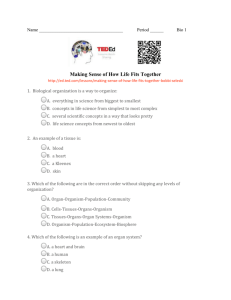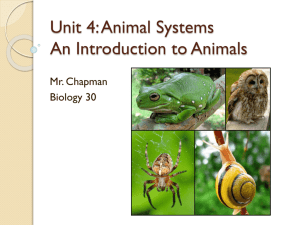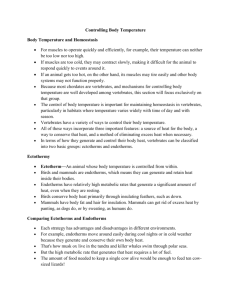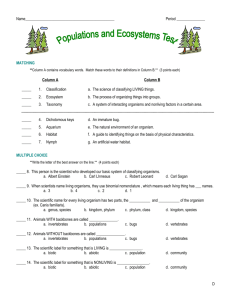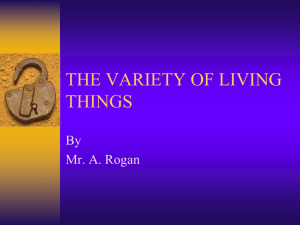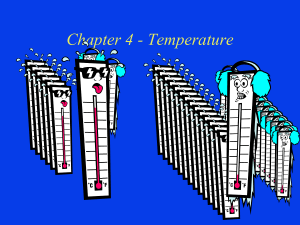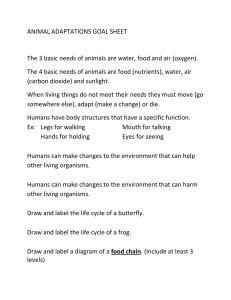Document 15244756
advertisement
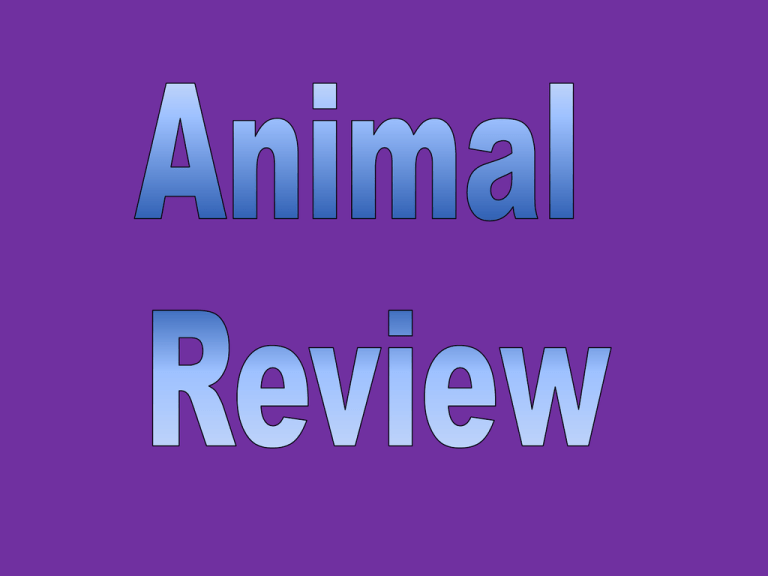
How are the organisms above similar to each other? A. They are both plants B. They are both cellular C. They are both vertebrates D.They are both cold-blooded 1 AND THE ANSWER IS . . . B. They are both cellular The chart below shows the rate of extinction of bird species over a 400-year period. During what year did the smallest number of bird species become extinct? A. 1600 B. 1670 C. 1730 D.2000 2 AND THE ANSWER IS . . . A. 1600 A student has drawn the diagram below in science class. The student has most likely drawn this diagram to A. Illustrate a food chain B. Attempt to classify organisms C. Determine the number of organisms in a population D. Represent different stages in the life cycle of an organism 3 AND THE ANSWER IS . . . B. Attempt to classify organisms Dogs (Canis familiaris) are most closely related genetically to which of the following organisms? A. African hunting dog (Lycaon pictus) B. Gray wolf (Canis lupus) C. Grizzly bear (Ursus arctos) D. Domestic cat (Felis catus) 4 AND THE ANSWER IS . . . B. Gray wolf (Canis lupus) Multicellular eukaryotes that are usually mobile and obtain food from other organisms probably belong to the kingdom — A. Plantae B. Fungi C. Animalia D. Protista 5 AND THE ANSWER IS . . . C. Animalia Feathers, wings, and the hollow bones of birds are examples of A. B. C. D. adaptations for flight responses to stimuli unnecessary body parts reproductive structures 6 AND THE ANSWER IS . . . A. adaptations for flight Planarians are freshwater organisms that can regenerate. Sonia had three petri dishes of planarians. In the same room, the first petri-dish was inside a cabinet, the second petri dish was sitting on her desk, and the third petri dish was partially covered by a book. After one hour, she noted the distribution of the planarians in each petri dish. Which was the independent variable in her experiment? A. Color of the petri dish B. Amount of Light C. Movement of planarians D. Temperature of the location 7 AND THE ANSWER IS . . . B. Amount of Light What do scientists look at/use in order to classify animals? 8 AND THE ANSWER IS . . . Characteristics What class of animals have scales on their feet and legs with two, three, or four toes? 9 AND THE ANSWER IS . . . Birds What are the two classes of vertebrates that are warmblooded? 10 AND THE ANSWER IS . . . Birds and Mammals Which of the following is an acquired behavior. a. A bird flying south in the fall b. A kitten drinking milk c. A dog leading a blind person 11 AND THE ANSWER IS . . . C A dog leading a blind person Acquired behavior is learned rather than inherited. What is binomial nomenclature? A. classifying organisms into seven levels B. the naming system developed by Aristotle C. grouping of animals based on how they move D. a naming system in which each organism is given a twopart name 12 AND THE ANSWER IS . . . D. a naming system in which each organism is given a two-part name Which of these invertebrates can live only in water? A. B. C. D. Insects Sponges Worms Mollusks 13 AND THE ANSWER IS . . . B. Sponges What is one adaptation of cnidarians? A. B. C. D. A mantle Tentacles Molting Metamorphosis 14 AND THE ANSWER IS . . . B. Tentacles Which group of invertebrates is the largest? A. B. C. D. Sponges Mollusks Cnidarians Arthropods 15 AND THE ANSWER IS . . . D. Arthropods All invertebrates have A. Simple body systems and go through metamorphosis B. Legs and absorb oxygen with skin or gills C. Exoskeletons and asexual reproduction D. No backbones and cannot make their own food 16 AND THE ANSWER IS . . . D. No backbones and cannot make their own food Cnidarians and sponges are similar because both A. Have tentacles with stinging cells B. Have complex nervous systems C. Get their food from the water around them. D. Get their oxygen from the air around them. 17 AND THE ANSWER IS . . . C. Get their food from the water around them. The chart below shows the rate of extinction of bird species over a 400-year period. If the trend continues in the graph, what will most likely be the number of species of birds that have become extinct by 2050? A. 40 B. 45 C. 50 D. 60 18 AND THE ANSWER IS . . . C. 50 Two adaptations that protect most echinoderms from their enemies are an A. internal skeleton and bilateral symmetry B. internal skeleton and spiny skin C. external skeleton and tube feet D. external skeleton and mobile larva 19 AND THE ANSWER IS . . . B. internal skeleton and spiny skin Which of these adaptations do most bony fish have? A. scales B. cartilaginous skeleton C. jawless mouths D. asexual reproduction 20 AND THE ANSWER IS . . . A. scales You see two small vertebrates near a rock. One is a lizard. One is a salamander. How can you tell which is a salamander? A. The salamander is one with four limbs B. The salamander is the one with the moist skin C. The salamander is the one that lays eggs D. The salamander is one with a tail. 21 AND THE ANSWER IS . . . B.The salamander is the one with the moist skin The main reason that birds sit on their eggs during incubation is that birds A. have internal fertilization B. always builds nests for their eggs C. must keep their eggs at a constant temperature D. Always raise their young in pairs. 22 AND THE ANSWER IS . . . C. must keep their eggs at a constant temperature Which of these describe all vertebrates? A. ectotherms with endoskeletons B. endotherms with vertebrae C. ectotherms or endotherms with endoskeletons D. ectotherms or endotherms with exoskeletons 23 AND THE ANSWER IS . . . C. ectotherms or endotherms with endoskeletons The body temperature of mammals and birds does not change with their environment because these animals are A. invertebrates B. ectotherms C. echinoderms D. endotherms 24 AND THE ANSWER IS . . . D. endotherms A body plan where one half of the body looks exactly like the other is known as (two words) 25 AND THE ANSWER IS . . . Bilateral Symmetry What is a type of mollusk with a hard shell made of two matching halves that is a filter feeder 26 AND THE ANSWER IS . . . bivalves The process of shedding the exoskeleton so that an arthropod can grow is known as 27 AND THE ANSWER IS . . . molting The simplest multicellular animals on Earth are 28 AND THE ANSWER IS . . . sponges A system that is made up of water-filled tubes that radiate out from the center of the echinoderm’s body is called what?(two words) 29 AND THE ANSWER IS . . . Water vascular system What is the most diverse group of mollusks 30 AND THE ANSWER IS . . . gastropods The process during which an organism changes its appearance during its life cycle is known as 31 AND THE ANSWER IS . . . metamorphosis Adult bodies of these arthropods have three body segments, a pair of antennae and six legs attached to the middle segment, the thorax 32 AND THE ANSWER IS . . . insects This type of arthropod, like the crab, has three or more pairs of legs and two pairs of antennae 33 AND THE ANSWER IS . . . crustaceans What are the group of invertebrates that live in the ocean whose name means “spinyskinned” called? 34 AND THE ANSWER IS . . . echinoderms An immature form or early stage of an organism which is different from the parent is known as 35 AND THE ANSWER IS . . . larva What is the name for the group of animals that most vertebrates are part of? 36 AND THE ANSWER IS . . . fish An animal with a backbone is known as 37 AND THE ANSWER IS . . . A vertebrate Animals that have tough, dry skin covered by scales, obtain oxygen through lungs, and lay their hard-shelled eggs on land are called what? 38 AND THE ANSWER IS . . . reptiles An animals whose body temperature changes with their environmental conditions(fish, reptiles, amphibians) is called 39 AND THE ANSWER IS . . . Exothermic An ectotherm Which classification level is broader than the phylum level? A. B. C. D. order class family kingdom 40 AND THE ANSWER IS . . . D. kingdom Animals that may have four limbs, lay their eggs in water, obtain oxygen through their smooth, moist skin and or lungs are called 41 AND THE ANSWER IS . . . amphibian What is the name for the journey of an animal from one place to another and back again? 42 AND THE ANSWER IS . . . Migration A chemical that is released by one animal that affects the behavior of another animal of the same species is known as what? 43 AND THE ANSWER IS . . . Pheromone Signals that cause organisms to react in some way are called what? 44 AND THE ANSWER IS . . . Stimuli or stimulus A state of greatly reduced body activity that occurs during winter is called what? 45 AND THE ANSWER IS . . . Hibernation What is the name for the type of learning that helps people ride a bike smoothly? 46 AND THE ANSWER IS . . . Trial and Error What is the production of light by chemical reactions inside the cells of living organisms called? 47 AND THE ANSWER IS . . . Bioluminescence This consists of all the actions an animal performs. 48 AND THE ANSWER IS . . . Behavior What is recognizing and following the first moving object seen after birth or hatching called? 49 AND THE ANSWER IS . . . Imprinting What is knowing what to do without being taught called? 50 AND THE ANSWER IS . . . Instinct What is doing something new by applying what you already know called? (two words) 51 AND THE ANSWER IS . . . Insight Learning What is the reaction to a stimulus called? 52 AND THE ANSWER IS . . . Response Animals use sounds, body positions, movements, and scent to do this. 53 AND THE ANSWER IS . . . Communicate What is learning to connect some kind of stimulus with a good or bad event called? 54 AND THE ANSWER IS . . . Conditioning What is a group of closely related animals of the same species that work together for a benefit of the whole group called? 55 AND THE ANSWER IS . . . Society What is an area that is occupied and defended by an animal or group of animals called? 56 AND THE ANSWER IS . . . Territory
